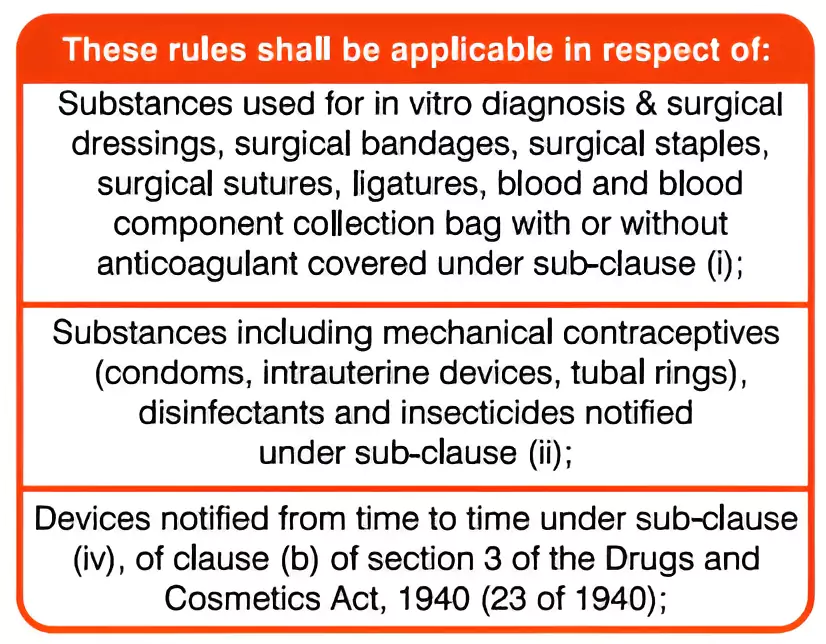Context
The Drugs Controller General of India (DCGI) has directed all medical device license holders and manufacturers to report any adverse events related to life-saving medical equipment on the government’s Materiovigilance Programme of India (MvPI) platform.
- Objective: To mitigate risks and safeguard public health by ensuring the safety and performance of medical devices through post-market surveillance (PMS).
What is a Medical Device?
A medical device is any tool or item made by a manufacturer for use in humans, either alone or combined with others.
- It includes instruments, machines, implants, reagents for testing, software, and similar items.
Enroll now for UPSC Online Course
Global Postmarketing Surveillance Approaches
- United States of America (USA): FDA regulates all food, pharmaceuticals, vaccines, and medical devices.
- Before entering into the market, medical devices must be authorized and approved by the FDA.
- Canada: Canada regulates licensing for modified devices .
- This licensing checks compliance criteria during the Pre Marketing phase.
- Japan: Pharmaceutical and Medical Device Agency supervises all medical devices that fall under certain rules.
- The agency gives certification, ensures quality , and provides license.
- Australia: Sponsors are required to submit records of medical devices to the Therapeutic Goods Administration (TGA) at time of introducing any product in the market.
- Records include batch number and ingredient information.
- United Kingdom (UK): UK maintains all databases and schemes for monitoring and reporting adverse events.
- Europe: National Competency Authority (NCA) oversees all medical devices and handles all complaints from manufacturers directly.
|
- These devices are meant for specific medical purposes, such as diagnosing, treating, or preventing diseases, managing injuries, supporting bodily functions, controlling conception, and more.
Types of Medical Devices:
- Instruments and Apparatuses: Includes tools and equipment.
- Implements and Machines: Various devices and machines.
- Appliances and Implants: Devices used in or on the body.
- Reagents for In-Vitro Use: Substances used for testing outside the body.
- Calibrators and Software: Tools for measurement and data management.
- Materials and Related Articles: Any other similar items.
About Materiovigilance Programme of India (MvPI)
Materiovigilance Programme of India is a national initiative to monitor the safety of medical devices in India.
-
Nodal Ministry:
- Ministry Of Health and Family Welfare
Pharmacovigilance
- It is also known as “drug safety”.
- It focuses on collection, detection, assessment, monitoring, and prevention of all adverse effects associated with the pharmaceutical products.
- It works like regulatory agencies within industry.
|
-
Significance:
- Comprehensive Reporting: MvPI is crucial for the systematic reporting of adverse events related to medical devices, including in-vitro diagnostic devices.
- Coordinated Analysis: The program facilitates coordinated analysis of the reported data to understand the frequency and severity of risks.
- Risk Mitigation: By identifying and addressing potential risks, MvPI helps in implementing measures to mitigate these risks.
Enroll now for UPSC Online Classes
-
Recommendations for License Holders:
- Mandatory Reporting: All medical device license holders should use the MvPI platform to report any adverse events or serious adverse events associated with their devices.
- Enhanced Compliance: The recommendation highlights the crucial need to adhere to MvPI guidelines to guarantee the safety of medical devices and safeguard public health.

-
- Governing Acts: Medical devices, including in-vitro diagnostic devices, are regulated under
- The Drugs and Cosmetics Act, 1940
- The Medical Devices Rules, 2017.
- Licensing Requirements: A license or approval is necessary for the import or manufacture of medical devices for the Indian market.
Challenges in Regulating Medical Devices in India
- High Dependence on Imports: India gets about 80% of its medical devices from other countries due to which India is very dependent on imports.
- Weak Domestic Manufacturing:
-
- Regulation Issues: There is no strong system in place to regulate medical device manufacturing.
- Limited Local Production: India produces limited components needed for medical devices within the country.
- Lack of Skilled Workers: A lack of skilled professionals also hinders the growth of a local manufacturing ecosystem.
- Dominance of Multinational Companies: Big international companies have the capacity to supply medical devices, which increases India’s reliance on imports.
About Post-Market Surveillance (PMS)
Post-Market Surveillance allows for ongoing evaluation of medical device performance in real-world use, going beyond pre-market testing.
- It helps identify new potential risks or adverse events associated with the devices.
Role of Post-Market Surveillance (PMS) for Medical Devices in India
- Ensures Safety and Performance: PMS has a significant role in guaranteeing the ongoing safety and effectiveness of medical devices after they enter the market.
- Identifies and Addresses Risks: Through PMS, potential risks or adverse events associated with the devices can be detected and addressed.
- Enables Timely Reporting: Timely reporting of adverse events is essential for PMS. This allows for:
- Identifying unforeseen risks.
- Analyzing how often known risks occur.
- Informs Corrective Actions: Based on PMS data, both manufacturers and regulatory bodies can take necessary actions to mitigate risks and safeguard public health.
- Utilizes MvPI Platform: The Materiovigilance Programme of India (MvPI) serves as a key platform for reporting adverse events related to medical devices.
Enroll now for UPSC Online Course
![]() 22 May 2024
22 May 2024
